Human health and pollinators
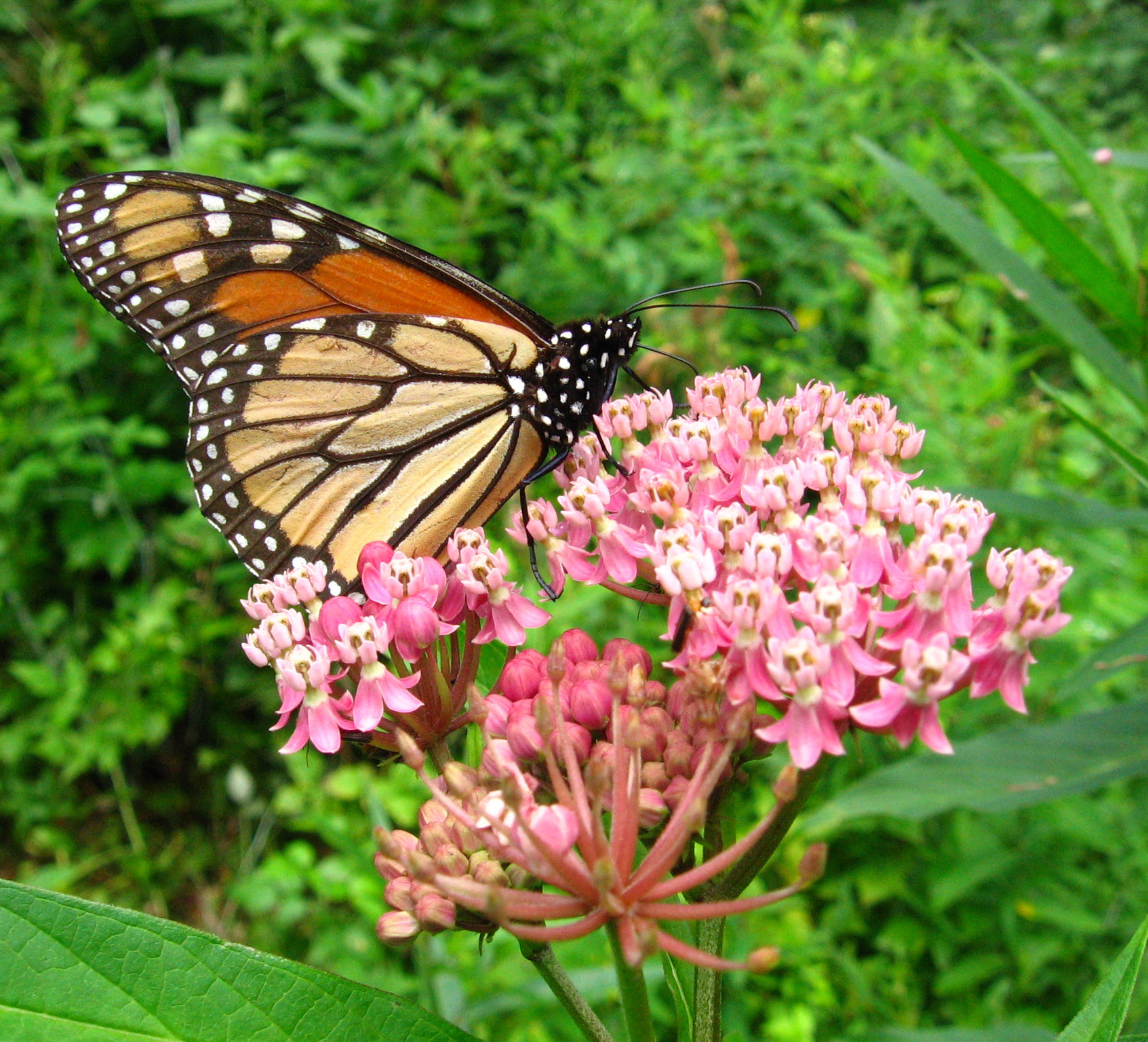
By Blake Van Jacobs
Last week was Pollinator Week—but why should you care? Humans rely on many insects, arachnids, birds, and bats to survive, and the work they do can make us healthier. We like to think of pollinators as bees and butterflies, because we generally like them, but it’s often our instinct to swat, spray, kill, and even discourage other pollinators from visiting our yards.
Did you know that at least 1 out of every 3 bites of food you take are possible because of pollinators? Eating is obviously essential to our survival, and the work these pollinators perform adds between $235-577 Billion worth of global food supply. Pollinators often go unnoticed, but they are critical to non-human species survival, biodiversity and this has a $50 Billion value to U.S. tourism and recreation.
Insects help humans survive by cleaning up—they eat plant matter, animals/other insects we consider pests (worth $4.5 Billion in pest control), already dead animals, and even dung. All of this helps to reduce the waste we deal with, disease, and can even prevent forest fires. Entomoptherapy is the use of insect derived products in medicine—everything from the use of honey to the treatment for inflammatory diseases (like arthritis, fibromyalgia, osteoarthritis) using bee venom—known as apitherapy.
Pollinator habitats is being reduced and disease, parasites, climate change, and contaminants/chemicals are reducing pollinators. Insects have been dying off at a rapid rate, with studies showing a 41% of species having steep declines in the last decade and 40% of insects species threatened with extinction. If these declines continue, it could lead to a “total collapse of nature” and threatens the survival of humankind.
You can help by creating a habitat in your yard. Plant clumps of native plants that flower at different times of the season and are correctly sited to the soil and sun. Don’t use pesticides/chemicals to control pests—create a healthy ecosystem so they take care of themselves. Don’t forget insects and all pollinators need help at all stages of their life—some need to eat the plants (monarch caterpillars and milkweed), not just the flowers; some need plants/trees for habitat, and they need places to survive the winter. Practice conservation for all pollinators, and support farmers who use less chemicals and provide pasture habitat. Together we can save pollinators…and ourselves.
A Plastic Pandemic
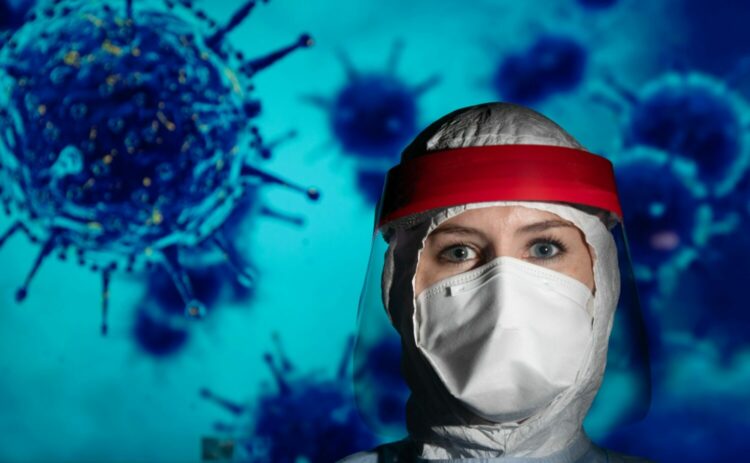
By Melanie Stewart
Plastic is the new dirty word. It’s in our air, oceans, soil, drinking water, virtually everywhere. Chemicals in plastic can leech into food and drinks and reduce fertility, harm fetal development, disrupt the endocrine system, affect children’s behavior, and even increase blood pressure. Plastic can break down into smaller pieces, but it never goes away—every piece of plastic ever created still exists today.
None of that was known when the first plastic was created in 1869 as a substitute for ivory, helping to stop the slaughter of elephants and tortoises. Nor did we worry about the effect as it helped us to win World War II—nylon was used for parachutes, ropes, and helmet liners, and Plexiglas replaced standard glass in aircraft windows. Single-use plastic items are a mainstay in healthcare, with sterile wrapped products reducing infection, while personal protective equipment (PPE) keeps both the patient and provider safe.
COVID-19 has increased our plastic use. PPE use has gone up, with one forecast estimating $166 billion will be spent on disposable masks in 2020. Most PPE cannot be recycled and it’s actually become an increasing amount of litter, as people toss what they perceive to be dirty on the ground—and this eventually makes its way into the ocean. Staying at home means more e-commerce, with Amazon seeing a 65% increase in customers. More people are ordering food online, which increases plastic use—containers, utensils, and bags. Many cities are temporarily banning reusable bags in favor of disposables. The International Solid Waste Association is estimating that single-use plastic consumption has increased 250-300% since COVID-19 began. To make matters worse, oil prices are low, making production of plastic cheap, while labor shortages are making recycling more challenging, which likely results in less items being recycled.
There’s still hope. UNMC/Nebraska Medicine developed a way to decontaminate and reuse some PPE. It’s easy/affordable to get a reusable mask for you/your family. Reusable masks have been shown to be safe to use. There is a lot of information available to help you reduce your plastic use—everything from buying more fresh fruits and veggies (and less packaged food) to buying plastic-free clothes (hint: most of what you are wearing is partially plastic) to consuming less in general.
Consider joining our plastic-free ecochallenge team. You pick the actions you want to take and/or learn about and can earn prizes while seeing the collective impact.
Saving Energy & Water at Home

By Melanie Stewart
Summer often means higher utility bills, and more money out of your pocket. Spending more time at home could increase those costs, but LiveGreen has some easy tips to help you save resources, money, and improve community health.
Your air conditioning (AC) unit uses a lot of energy to keep you cool but you can lower that cost by using a programmable thermostat, keeping sources of heat (lamp, TV) away from your thermostat, changing your HVAC filter regularly, vacuuming return air vents, and planting the right tree/shrub in the right spot. Raising the thermostat by 1 or 2 degrees can also have an impact, and you can use a fan to keep you cool. Turn the fan off when you leave a room—fans cool people, not spaces.
Reduce the heat that your AC has to overcome and use less electricity by swapping incandescent/halogen bulbs for LEDs, turning items off and unplugging infrequently used items (consider smart strips), keeping curtains/blinds closed to direct sunlight, making sure vents aren’t blocked by furniture/toys/curtains, and keeping the damper shut on the fireplace (consider a flue blocker). Turn your water heater temp down to 120°F—it’s still plenty hot for showering and cleaning. Don’t use your oven on the hottest days—instead opt for the grill, toaster oven, or crockpot. Dry laundry by hanging it outside (or inside) rather than using the dryer and run your washer on the highest spin cycle possible, getting the most water out and decreasing dry time (saves energy all year round!).
Speaking of laundry, do full loads to save water, electricity, and soap—this applies to the dishwasher too. Unless your dishwasher is really old, it uses less water than handwashing, so save yourself some time and load it up. To save more water, fix drippy faucets and running toilets, install low-flow shower heads and fixtures, monitor your sprinkler system, and take shorter (or maybe even less?) showers. For more water saving tips, check out our Every Drop Counts page.
Already an energy/water saving expert? Adding insulation to your attic, replacing windows, and making sure your ducts are sealed properly will save energy and pay you back over time. Installing a tankless water heater, high-efficiency toilets, and upgrading to energy star rated appliances will raise your status to pro.
To learn how much you can save with these and other simple changes, check out this calculator.
Healthy Gardens

by Blake Van Jacobs
Last week we shared with you the benefits of eating more fruits and veggies, buying locally grown produce and community gardens. If you have the space and the desire, growing a garden in your backyard is great! It’s also good for your physical and mental health.
Gardening is not a “plant and leave” activity–it requires care and attention to grow what you want, and to do so in a healthy, safe way. When deciding what to plant and when to plant it, Cornell University has a great resource on the proper place to plant different vegetables or flowers, plant traits, and special considerations.
The Omaha Library in Benson has a seed library–seeds you can check out to grow (you return seeds in the fall), as well as community resources, book recommendations, and other gardening resources.
A way to get your vegetable garden started is to build out the Square Foot Garden. This method plots your garden by each square foot. Plants are properly spaced, it’s easy to water, and you can fit the largest amount of plants in the space. Use this resource to help with proper soil, if you’re filling a bed.
Think you need a fertilizer? Try compost. It reduces landfill waste, is better for your soil and plants, and safe to handle. You can compost at home or buy compost. Want to learn more? LiveGreen is hosting a 30 minute webinar, Wednesday, June 17th at 11am on composting and we’d love to see you there!
If you have to use a fertilizer, know that many large amounts of chemicals that are bad for the plants and soil. The Organic Material Review Institute OMRI has a safe product list. This is an unregulated industry, so be cautious and do research—a package that says “organic” does not mean its safe.
Insects and weeds are a fact of life. Weeds can be pulled (part of the health benefit!). Insecticides will kill everything, including the pollinators the plants need—and potentially the birds that eat those bugs. It’s best to let nature do its thing and know that you may lose a few leaves or some produce in the process, but you and the ecosystem will still be better off.
If you do have to buy a pesti/fungi/herbi-cide, there are some chemicals you should avoid, like DDT, Glyphosate, and Atrazine. Other chemicals to avoid can be found here.
photo credit: freeimages.com/ramzihashisho
Victory Gardens
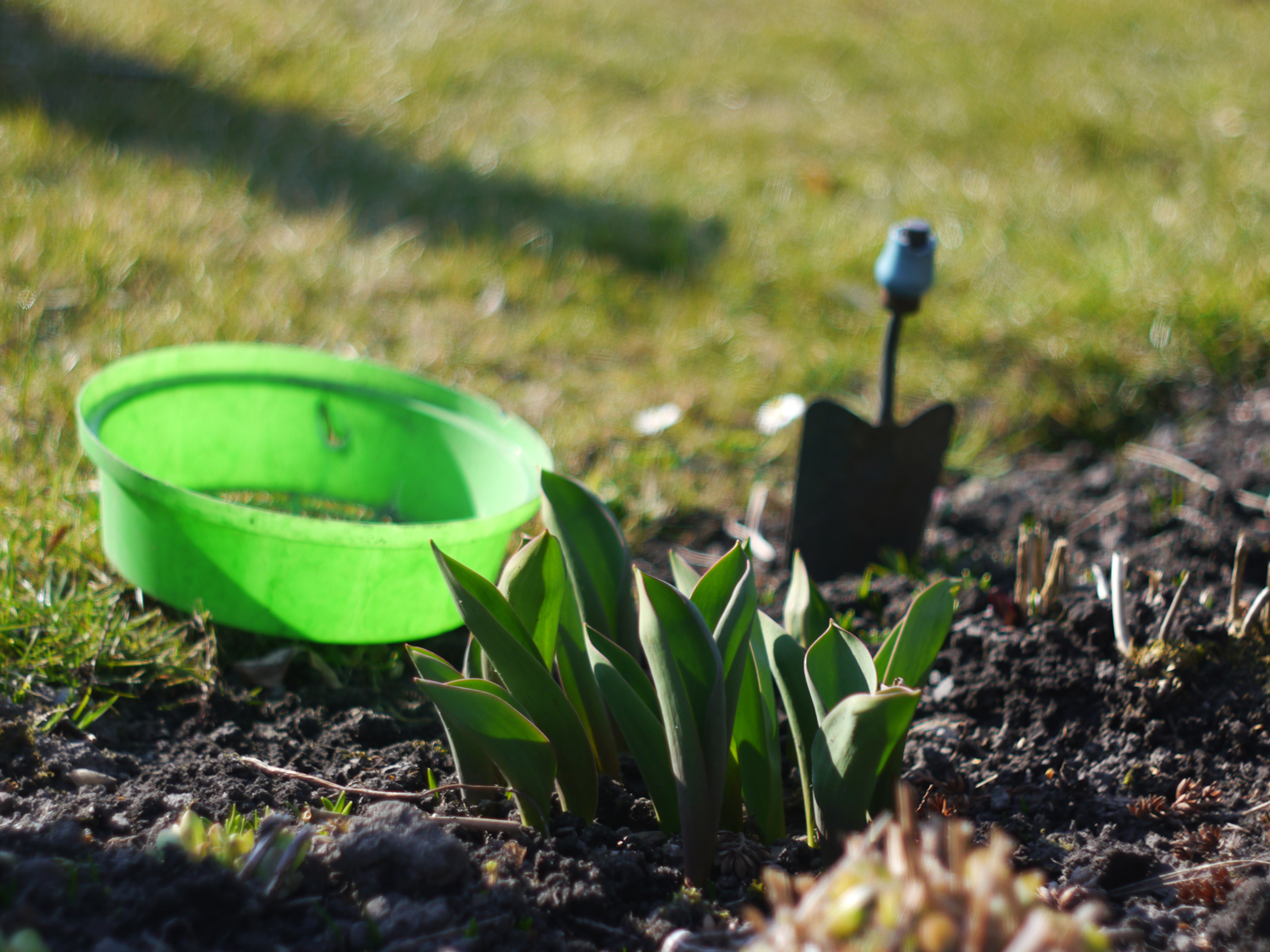
There has been a renewed interest in gardening, specifically vegetable gardening, this spring. The pandemic forced us to consider food shortages and staying at home means more free time and the need to fill that time.
You don’t need a lot of space and the Nebraska Extension Office has lots of resources to get you started.
If you live in an apartment or don’t have a yard to garden in, consider participating in a community garden. Community gardens can increase resiliency by relying on your community to grow food and come together as just that: a community. Investing time and resources into local shared gardens will make it easier to eat healthy, get to know the people in your neighborhood, and reduce crime. It’s also good for your physical and mental health.
In Omaha, there are numerous community gardens that you can get involved with. Douglas County has a great database listing all of the gardens, including a searchable map so you can find one near you. Pick a community garden close to your home and make sure to contact the garden organizers first to let them know you are coming. At some community gardens, you can become a member which will allow you to buy a small plot. There may be a waitlist, so if you are interested, check on that quickly.
If gardening isn’t your thing but you still want to eat more local produce (did you know it can help you fight Coronavirus?) consider the Farmer’s market. Due to COVID-19, we won’t be having a Farmer’s Market on campus this year, but they started in Omaha last weekend.
Area Farmer’s markets look different this year but are still a great option to purchase local food and reduce your carbon footprint. There are a few great markets here in Omaha and you can go here to check out those closest to you. Local food is seasonal and fresh, you invest in a sustainable/local economy, and the amount of emissions and environmental toxins is drastically reduced. You will not only be eating healthier, but you can try new types of produce that you may not have had before.
Many of the farmers associated have community supported agriculture (CSA) or delivery options that are minimal contact.
Poison Prevention during the COVID-19 Pandemic

Social distancing presents challenges beyond decreased access to basic needs and services. Disruptions to daily routines, isolation and anxiety around circumstances can lead to poisoning, both accidental and intentional.
Children are naturally curious and like to mimic the adults in their lives. Because of this, it is important to:
- Teach children to ask before touching or tasting anything they find on their own.
- Purchase medication in child-resistant packaging whenever possible.
- Never refer to medicine as “candy” or another appealing name.
- When taking medication, remember to be out of the sight of children.
- Read all labels closely and take only as recommended.
Unused medications can be abused by family members creating an unnecessary risk. Medications not properly disposed of are often trashed or flushed, both having negative effects on the environment, animals, and people downstream.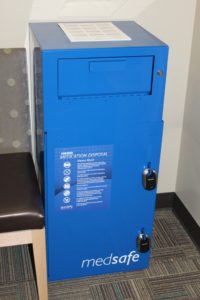
Nebraska Medicine’s three outpatient pharmacies (DOC, Bellevue, and University Health Center in Lincoln) offer a free drop-off site for unneeded, unwanted, or expired medications. Any medication, including controlled substances/those in liquid form, can be dropped into the box. It’s a service to our patients, colleagues, and students to provide a way to properly and safely dispose of medications. Community locations can be found here.
Many people are focusing on cleaning in their homes. Remember these safety tips:
- Do NOT mix cleaning products together. Mixing bleach with an acid (like vinegar), some toilet bowl cleaners, or ammonia will result in a highly toxic chlorine/chloramine gas.
- Store household chemicals, and all cleaning products, in their original container.
- Always use in a well-ventilated area.
- Wear gloves to avoid skin contact.
- Follow label directions.
If soap and water is not available, hand sanitizers may help decrease unwanted germs on hands. Children are attracted to hand sanitizers because packaging may be in brightly colored bottles and smell like candy or food. These products usually contain > 60% ethyl alcohol which could cause alcohol poisoning. Some of the “homemade” sanitizers may not have labeling of ingredients and could pose a danger with exposure in mouth or eyes. Tips to keep in mind:
- Always supervise children when using hand sanitizer.
- Only use a dime-sized amount and rub in skin until dry.
- Avoid eye exposure.
- Keep out of reach and sight.
If you or a family member has ____ call the Nebraska Regional Poison Center, 1-800-222-1222—a free community service to the public available 24/7/365. You will speak immediately to a Registered Nurse or Pharmacist.
Healthier, Less Toxic Cleaning

By Blake Van Jacobs
As we move into a time where we are cleaning as much as we can, how do we know what products are environmentally friendly and safe for our health? Cleaning products are not always regulated but there are a couple of certifications to look for when shopping for natural cleaners. These certifications set environmental and human health standards, as well as performance standards.
Green Seal sets criteria for toxicity limits, indoor air quality, chemicals of concern, waste reduction, manufacturing processes, and water and energy use. Green Seal also sets strict performance standards for the cleaning products they certify. Specifically, general purpose cleaners must kill 80% of the particulate soil and bathroom cleaners must kill 75% of the particulate soil in the American Society for Testing and Materials. Green Seal is one of the most trusted standards when it comes to natural cleaning products that are a better option than other more toxic cleaning products.
The second certification is from Underwriters Laboratories (UL) EcoLogo Certification. This criteria includes materials, product performance, human and environmental health impacts, waste diversion, and natural resource conservation. These certifications will indicate which cleaners will disinfect properly, in addition to being safe for the environment and your home.
Besides reviewing the labels that certify the cleaners, avoid products that have labels saying warning, poison, flammable, or corrosive. Also, try to refrain from purchasing aerosol cans, these produce volatile organic compounds which creates an unhealthy gas that makes indoor air quality worse.
Homemade cleaners are effective and can save you money, while being less toxic than traditional cleaners. For bathroom surfaces, countertops and cutting boards, use a 10% vinegar/90% hot water mixture to remove germs, mold, and dirt. For toilets and bathtubs, you can scrub the fixtures using baking soda , while vinegar works great on mirrors. Worried about COVID-19? Don’t forget about good ‘ole soapy water. The soap/detergent destroys the outside of the virus and kills it. It’s cheaper for you and less harmful than bleach and other cleaners. These homemade cleaners are natural, easy to use, and will get surfaces cleaned and sanitized. LiveGreen has also tested several specific cleaners to make sure they are effective, and those recipes can be found here.
Have a favorite homemade cleaner? Send your recipe to LiveGreenNebraska@unmc.edu and we’ll add it to the list for others to try.
Earth Month COVID-19 Style

By Melanie Stewart
Like many things in 2020, Earth Month looked a little different this year. Instead of a variety of in-person events to celebrate the Earth Day’s 50th anniversary we, like everyone else, had to pare things back and find ways to do them while social distancing.
Here’s a quick recap:
We had the Repurpose It contest again, and your creative colleagues did not disappoint! If you missed the contest, you can still see the entries here. There are a lot of great ideas that you use as inspiration to reuse. Your winners are:
1st place, Merrilou Klug, bicycle wheel trellis, wins $25 gift certificate to The Company Store.
2nd place, Debi Griffith, old piano pieces holds jewelry, wins a green-thumb basket from Union Junktion ($25 value)
3rd place, Debbie Vidlak, table legs/window become new desk, wins $25 UNMC Bookstore gift certificate.
We hosted our first ever internet scavenger hunt and many of you took part! We hope you had fun and learned something new. There are lots of prize winners so we’ve contacted them directly and posted their names to the webpage so you can know too.
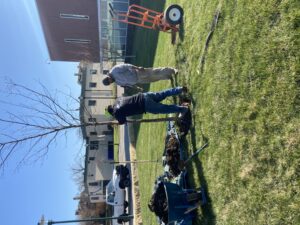 We also celebrated Arbor Day. None of us were there to watch or help, but a Chinkapin Oak was planted in front of the Harold M. and Beverly Maurer Center for Public Health. This is the first Chinkapin on campus, which aids in biodiversity and disease protection. Chinkapins like direct sun and adapts to soil types making this location a good fit—and replaces the tree that was hit by a car last year. As it grows, it will provide a great amount of shade for people to enjoy with a great view of the plaza.
We also celebrated Arbor Day. None of us were there to watch or help, but a Chinkapin Oak was planted in front of the Harold M. and Beverly Maurer Center for Public Health. This is the first Chinkapin on campus, which aids in biodiversity and disease protection. Chinkapins like direct sun and adapts to soil types making this location a good fit—and replaces the tree that was hit by a car last year. As it grows, it will provide a great amount of shade for people to enjoy with a great view of the plaza.
Last but not least, we fielded a team to take place in the online Earth Day Ecochallenge. Our team did great—we finished 12th out of 818 national/international teams! We also challenged UNO’s team and more than doubled them up on points…not that we’re bragging or anything. The “little” actions taken by members of our team resulted in the savings of more than 3,000 gallons of water and 2,800 lbs of CO2, while reducing food waste, disposable plastic, and miles traveled by car, just to name a few. Impressive all the way around!
The format for this Earth Month may not have been our preference, but it worked and we had a great time finding new ways adapt.
Pandemic impacts transportation emissions
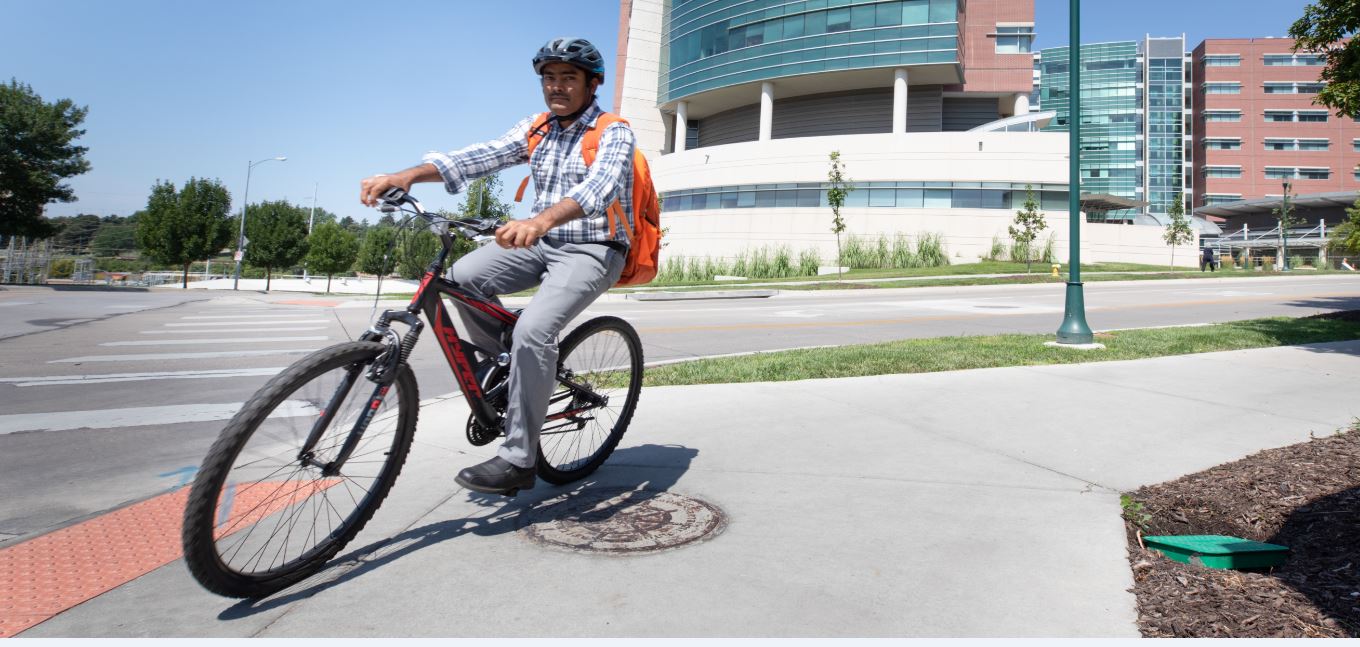
News stories are showing a decrease in greenhouse gas (GHG) emissions in places around the world. A Stanford University study of China estimated that by early March, reduction in pollution already had saved (by most conservative measures) more than 53,000 lives there.
Here in Nebraska, statewide traffic volume decreased as much as 35% during the week of April 12- 18 when compared to annual averages from 2016-2018 for the same time period. Traffic on Omaha’s streets and highways decreased by as much as 39% in mid-April. While this is not a tool that shows local impacts of GHG emissions and reduced travel, a new interactive tool simulates various emission scenarios and allows users to change the percentage of people living in the U.S. participating in climate-friendly behaviors, such as working from home.
While this extraordinary reduction of GHG emissions is something to take note of, the effects may be temporary. Stay-at-home orders will not last forever, and when cities reopen, societies and economies will start to return to business as usual. If that happens, global GHG emissions could rebound and return to pre-COVID-19 levels, compromising everyone’s health.
That said, these reductions demonstrate the impact we can have as individuals. Every time we choose to walk, bike, carpool, or use transit, we reduce those harmful emissions and have a positive effect. Our impact can be even greater as our actions can help to guide decision makers as the “next normal” begins: reductions were great enough in Milan, Italy, that city officials are changing how the city reopens, re-imagining and redesigning city streets and sidewalks that prioritize pedestrians and cyclists and their safety.
National Transportation Week may be a little different this year, as we focus on walking and biking to maintain social distancing. UNMC also has joined forces with the University of Nebraska at Omaha to take part in the National Bike Challenge. It runs May-September, and participants can create their own goals, log bike miles (for commuting or recreation). It’s app friendly and offers prizes. Members of the med center community and their families can join the UNMC/Nebraska Medicine team.
Regardless of the changes made, every trip that uses active transportation improves the health of everyone who breathes.
Transportation Week is May 11th – 15th
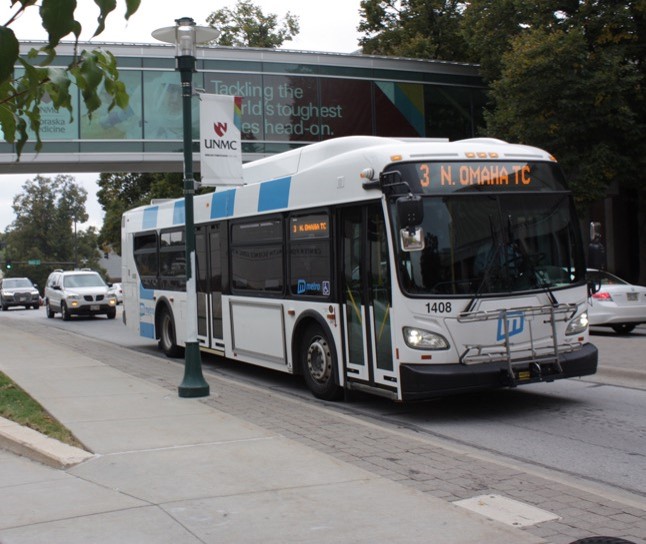
By Tina Spencer
The third Friday of every May is National Transportation Day, which was created to help honor the work of employees in the transportation industry. This year we are more grateful for our bus drivers and other transportation service providers, as they continue to connect our essential workers, healthcare providers, and patients throughout the city at great personal risk.
Usually we would ask that, to honor National Transportation Week, you try taking the bus for the first time or encourage a friend to do so. Taking the bus has a healthy and positive impact on everyone’s health as emissions from road vehicles are the largest contributors to air pollution. Due to the need to continue our efforts to limit the spread of the coronavirus, this year is different. Our focus during this year’s National Transportation Week will be on walking and biking, another healthy form of active transportation.
As the weather grows warmer and the potential to spend more time outside increases, consider using a bicycle fo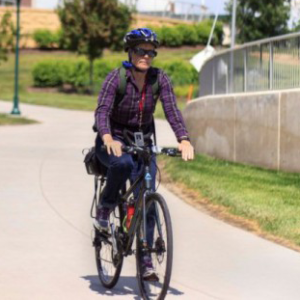 r exercise and even to pick up essentials. Now is a great time to perform routine maintenance on your own bike such as adjusting brakes, repairing any flat tires and maintaining bicycle chains. Be safe and don’t forget to wear a helmet! Make sure it fits correctly so it protects your head.
r exercise and even to pick up essentials. Now is a great time to perform routine maintenance on your own bike such as adjusting brakes, repairing any flat tires and maintaining bicycle chains. Be safe and don’t forget to wear a helmet! Make sure it fits correctly so it protects your head.
If you don’t own a bike, Heartland Bike Share has stations available on campus and in the Omaha metro area for you to check out a bike and ride! Bike sharing offers a great chance for you to choose active transportation for short trips and it’s a great health benefit as well. Riding a bike is good exercise for our physical health, while also getting to where you need to be. Biking and walking can help to increase blood flow, release endorphins, and reduce overall stress, helping to improve mental health and increase energy. Always remember to be respectful of pedestrians on local trails, and keep your distance!
LiveGreen will be hosting an online conversation with Miah Sommer, Founder and Executive Director of the Bike Union Mentoring Project on Tuesday, May 12th from 10:30-11:00. He will discuss the history of the project, ongoing programs and some tips for keeping your bike in good shape while shops are closed.
Check out our Facebook page for transportation posts all week!
